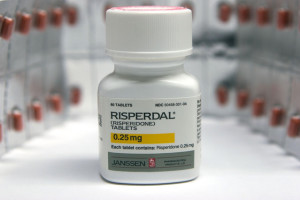Risperdal Side Effects Lawsuit - Risperidone Tardive Dyskinesia Risk
Author: Ava Lawson | Posted In: Risperdal

Arkansas resident Carry Ball is suing Janssen Pharmaceuticals, Inc. and Johnson & Johnson based on allegations that the defendants designed, manufactured and sold a defective drug known as Risperdal, causing her to suffer permanent injuries. Ball contends that as a direct and proximate result of her exposure to Risperdal, she now suffers Extrapyramidal Symptoms (EPS) and tardive dyskinesia, characterized by uncontrollable mouth and tongue movements, trouble speaking, tremors, and shaking. Furthermore, Ball’s Risperdal side effects lawsuit claims that she also developed diabetes, gastrointestinal problems, urinary incontinence, and other physiological conditions from taking the atypical antipsychotic.
Her complaint was originally filed in the Pulaski County Circuit Court but has been moved to the U.S. District Court for the Eastern District of Arkansas in Little Rock. Patriot Pharmaceuticals, LLC, AstraZeneca, Little Rock Community Mental Health Center Inc., and Little Rock Community Mental Health Center Pharmacy are also listed as defendants on the complaint. Ball is demanding compensatory, general and special damages for her pain and suffering, mental anguish, embarrassment and humiliation, past and future health care costs, caretaking expenses and medical monitoring.
Risperdal side effects lawsuit facts and allegations
Court documents state that Carry Ball was diagnosed with Major Depressive Disorder (MOD) with recurrent psychotic symptoms and Post Traumatic Stress Disorder (PTSD) in 2005, for which she was prescribed both Seroquel and Risperdal. She took both medications on and off for a period of years, as directed by Dr. Brandon Wall and other physicians at Little Rock Community Mental Health Center. The plaintiff argues that Risperdal and Seroquel were not FDA approved for treatment of depressive symptoms unassociated with Bipolar Disorder, MOD or PTSD during the time frame when she took both medications, and to her knowledge, are still not approved for this off-label use today.
Risperdal was falsely promoted by the defendants as an effective treatment for schizophrenia and Bipolar Disorder, and was falsely promoted as a safe treatment for non-FDA approved uses, such as for PTSD and MDD, according to Carry Ball. The lawsuit further contends that the defendants downplayed and covered up the Risperdal tardive dyskinesia risk posed to patients taking the drug as prescribed and for those taking it for non-FDA approved uses.
Adverse Risperdal side effects were known to the manufacturers based on their own clinical research, but the defendants failed to warn both the public and health care community of these risks, according to the complaint. Carry Ball, like others who’ve filed a Risperdal side effects lawsuit, states that the defendants knew or should have known that the antipsychotic causes neurological problems including EPS and tardive dyskinesia, in addition to diabetes, pancreatitis, hyperglycemia, cardiovascular complications, incontinence, and metabolic syndrome, yet the product labeling has failed to provide an adequate warning of these and other adverse reactions.
Ball is also seeking punitive damages for the alleged willful, fraudulent and reckless acts of the defendants who demonstrated a disregard and indifference for the safety and welfare of the general public.
Risperdal and tardive dyskinesia
Ball’s complaint isn’t the first Risperdal side effects lawsuit that alleges the drug caused symptoms of tardive dyskinesia. In 2000, a Philadelphia circuit court jury handed down a $6.7 million verdict to a patient who developed the permanent movement disorder after taking Risperdal (generic: risperidone).
Forty-five year old Elizabeth Liss was diagnosed with bipolar disorder by psychiatrist Jan W. Doeff, who prescribed Risperdal. Jurors found that Dr. Doeff was negligent in his treatment. After taking Risperdal, Liss developed a form of TD called tardive dystonia – a condition that causes her to make uncontrolled facial grimaces and suffer impaired swallowing and occasional bouts of irregular breathing.
1 comment:
Tardive means "delayed" and dyskinesia means "abnormal movement."
Just a fancy way of saying "abnormal movement".
Post a Comment